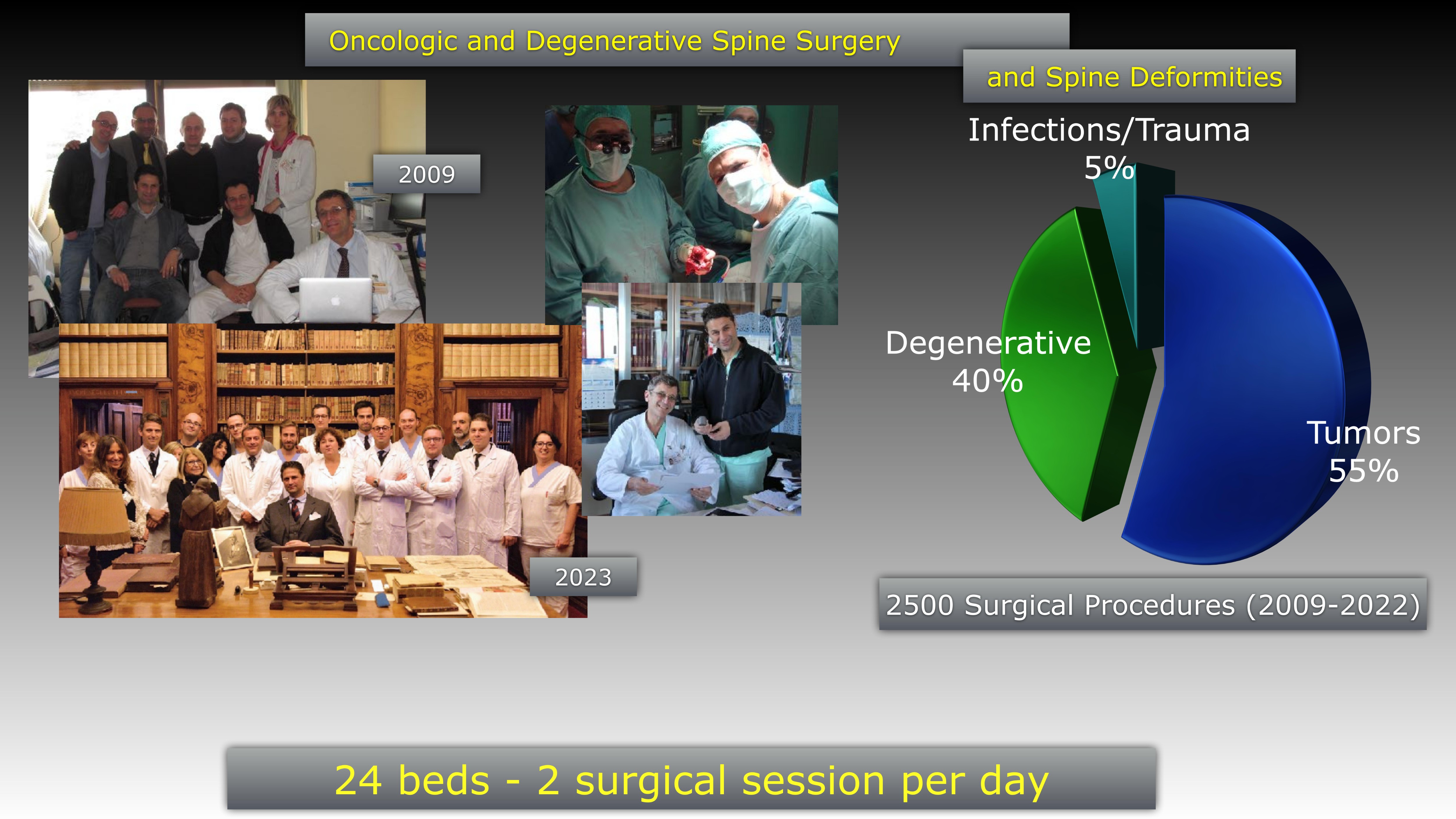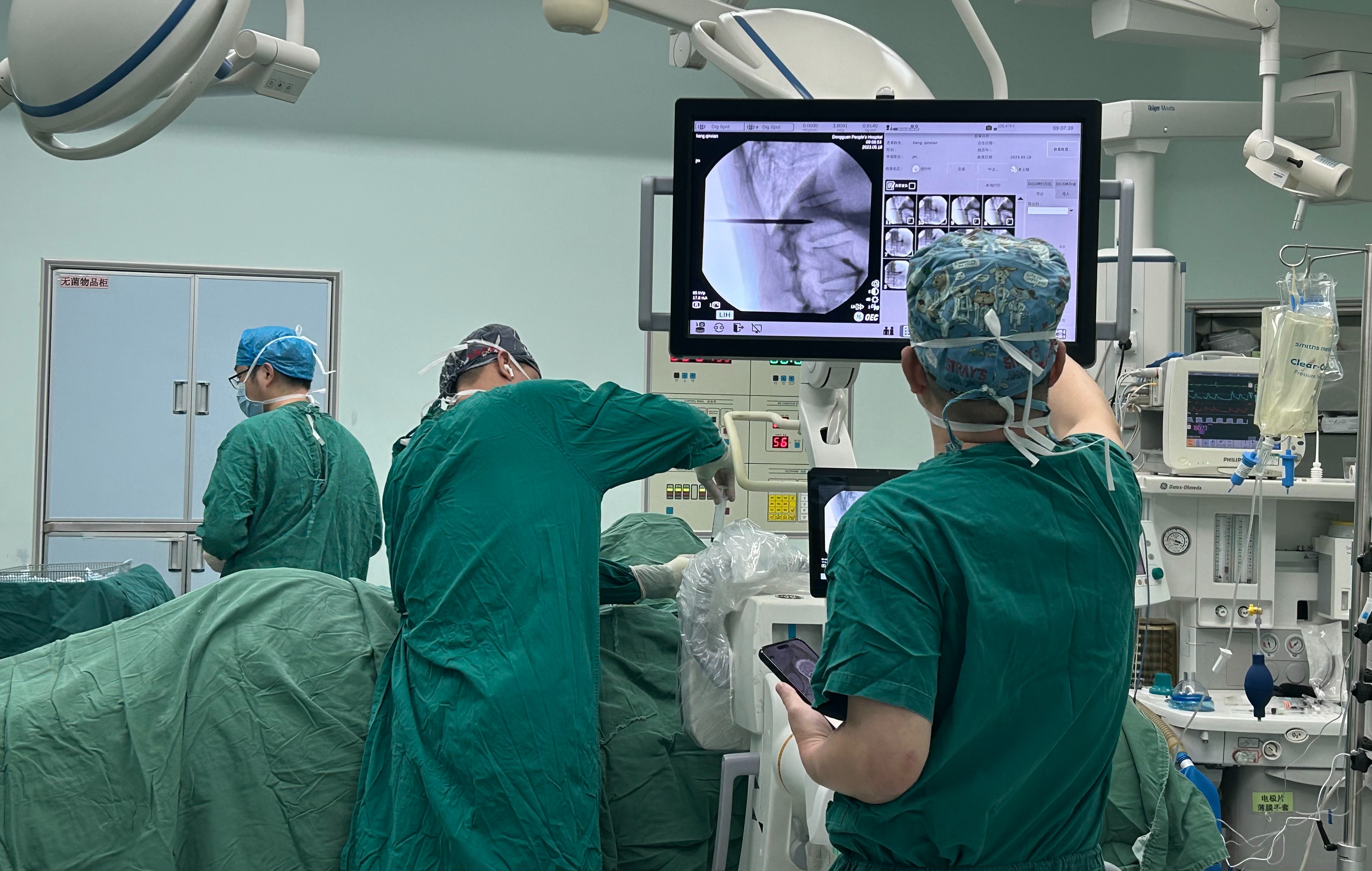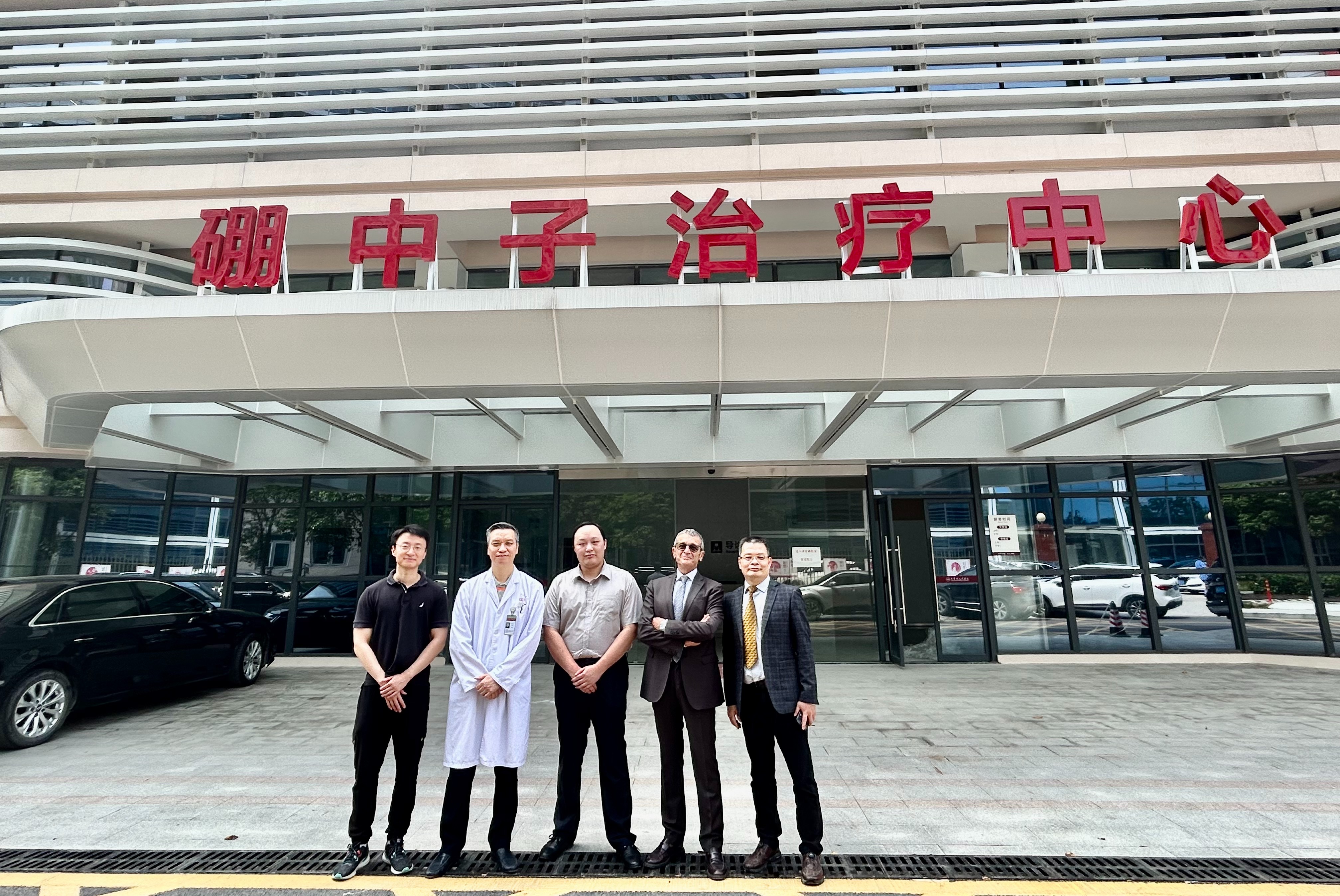-
News & Events

From May 15th to 19th in 2023, Prof. Boriani, the world-class master for spinal tumor, the co-founder of WBB surgical staging system, Past-Chairman of the Unit of Oncologic and Degenerative Spine and Scientific Advisor at IRCCS Rizzoli Orthopedic Institute, Bologna came to Dongguan People’s Hospital as its international visiting professor and carried out a series of activities for academic exchanges, including making rounds, providing surgical guidance, performing operations, giving training to the department, discussing the management of the department and difficult cases, giving public classes and so on.
In May 2020, the Department of Orthopedics Third District of Dongguan People’s Hospital established the Department of Bone Tumor. After three years of development, the department takes shape and successfully treated over 500 bone tumor patients last year. In 2019, Dongguan People’s Hospital invited Prof. Boriani as its visiting professor.
The world-class master for spinal tumor Prof. Boriani took a flight to Guangzhou from Bologna and arrived there late at night on May 14th.


Prof. Dr. med. Stefano Boriani
Past-Chairman of the Unit of Oncologic and Degenerative Spine and Scientific Advisor at IRCCS Rizzoli Orthopedic Institute, Bologna
Introduction
Past Chairman of AO Spine Italian Council
Past Chairman of the Master Course (European Diploma Program) of Eurospine Foundation
Associate Editor of: SPINE; European Spine Journal; Orthopedics; Journal of Spine Surgery
Major contributions that are recognized worldwide are:
• The original staging systems for primary tumors, well known as WBB presented in 1996 and now applied by most spine oncologic surgeons.
• A great number of homogeneous series of spine tumor cases carefully studied and published on peer-reviewed journals.
• Original techniques of spine tumor resection.
Prof. Boriani introduced the incredible history of Rizzoli Institute in Bologna. It used to be an exquisite monastery in the 14th century. During the war, Napoleon led the French army to burn down this monastery. In 1896, the famous Italian surgeon Francesco Rizzoli bought the monastery, rebuilt it and turned it into the first orthopedic hospital in Italy. Currently there are 344 beds and around 15,000 operations are performed here annually.

In 1984, with the encouragement of his mentor Prof. Campanacci, Prof. Boriani started his professional life dedicated to bone tumors of the spine. The Unit of Oncologic and Degenerative Spine Surgery has 24 beds. Prof. Boriani has collected 2020 cases on the subject of spine tumor so far, which surprises the colleagues worldwide. There are 300 employed researchers carrying out scientific research in the hospital and around 400 articles are published in top academic journals each year. With the joint efforts of his mentor Prof. Campanacci, Prof. Boriani and his colleagues, more than 20,000 bone and soft tissue tumor cases were documented at the Rizzoli Institute till now and it has become the most famous hospital for treating spine tumor in Europe and even around the world. Prof. Boriani has been dedicating to seeking for the best solution for treating spine tumor.

Opening Ceremony for the Sino-Euro Communication Center for Bone Tumor
Early in the morning on May 15th, Prof. Zhu Wenxiong, the Director of the Department of Orthopedics Third District, along with his whole team, stood in line and welcomed Prof. Boriani at the door of his department.
After that, they introduced their own department and hospital. Director Zhu and his team introduced many cases of bone metastases received by their department in recent years to Prof. Boriani. There were a number of cases of different types, which left a deep impression on Prof. Boriani.

Later on, despite busy schedules, Cai Limin, the Party Secretary/President of the hospital and other leaders in the hospital came to the department to issue the plaque for visiting professor and unveil the Sino-Euro Communication Center for Bone Tumor with Prof. Boriani. President Cai warmly welcomed Prof. Boriani and said that Prof. Boriani came in person to provide guidance and share his profound clinical and research experience, which would definitely provide more opportunities for the construction of the subspecialty of bone tumor of the hospital.

In recent years, Director Zhu and his team have been working on percutaneous hollow screw fixation combined with cementoplasty in the treatment of periacetabular metastases, which is a MIS technique, and have collected massive related cases to make preparations for clinical research.
Many months ago, they prepared an English manuscript on this topic, which was sent to Prof. Boriani for his advice. They also hoped to have the opportunity to publish the paper in international journals together with him. This afternoon, Prof. Boriani provided his suggestions in detail for Director Zhu and his team. He commented that it is a great idea and encouraged his team to collect more follow-up patient data and further work on this topic. We look forward to the final paper shared by Director Zhu’s team in the future.

Visit the large and bright operating rooms in China
The day May 16th marked the first day that Prof. Boriani joined the orthopedic surgery performed in the Dongguan People’s Hospital. Director Zhu and his team showed Prof. Boriani around the operating rooms. There are various operations going on each day in the 23 operating rooms here. Prof. Boriani marveled at the spacious and bright operating rooms, large corridors that made it easy to transport patients, well-designed channels and well-planned operations.

After the tour, Prof. Boriani observed three operations performed by Director Zhu and his team, who explained the operations in English during the whole process to Prof. Boriani. These three operations were the resection of periacetabular metastasis from lung cancer, left upper arm lipoma resection, and spine surgery for degenerative lumbar spine disease.


Prof. Boriani enjoyed his time in the operating room very much and hoped to share his surgical experience in Chinese hospitals with his colleagues when he comes back to Italy.
In the afternoon, the department conducted case discussions with Prof. Boriani and shared many newly received cases of bone metastases of the spine to Prof. Boriani. Prof. Boriani thought this was eye-opening and said that some rare diseases are not rare in China.
Director Zhu specially shared the valuable experience of his Chinese fellows on the surgical treatment of metastases in the upper cervical spine, and they also discussed the MISS techniques at home and abroad, especially the endoscopic spinal surgery.
A successful resection surgery for thoracic metastasis of lung cancer
After arriving at the hospital on the morning of May 17th, Director Zhu took Prof. Boriani to make ward rounds and introduced the conditions of the patient that would do the operation later. The surgery today was quite difficult. The patient was a male in his sixties who suffered from thoracic metastasis of lung cancer.

After knowing the conditions of the patients, Prof. Boriani thought it was not advisable to perform MISS on this type of patients. This is because the incision of MISS is too small. Therefore, if the patient bleeds out during the operation, it is difficult to observe the condition inside; if the tumor is not completely removed, the patient won’t be effectively treated. It is improper to only go after MISS as the goal of the operation should be total removal of the tumor. Director Zhu quite agreed with Prof. Boriani’s point of view.

During the operation, Director Zhu and Prof. Boriani worked together and performed the operation smoothly and skilfully. Although this was the first time that they performed an operation together, they were like comrades with perfect cooperation. Few hours after the operation, the patient could move his leg with flexibility and was very satisfied with the result of the surgery.

In the afternoon, Director Zhu and his team gathered in the meeting room and started heated case discussions with Prof. Boriani. Prof. Boriani shared many of his cases on resection of spinal metastases in Italy, including a very difficult operation to remove L2 spinal metastasis from colon cancer. With the joint efforts of thoracic surgeons, Prof. Boriani completed this operation which took 10 hours, impressing the Chinese surgeons there.
A new treatment algorithm for spinal metastases
On the morning of May 18th, Prof. Boriani made rounds together with Director Zhu and his team. They also visited the patient who could freely move after the operation yesterday and Prof. Boriani spoke highly of the surgical result.


Later on, Deputy Chief Physician Jiang Ming from Director Zhu’s team showed a case of spinal metastasis treated by microwave ablation and to find out the type of the tumor through biopsy.

Given the vast population in China and the much more number of tumor patients than in Italy, Prof. Boriani suggested that they could also work on prospective studies regarding treating spinal metastases with microwave ablation and pay attention to its long-term effects. Director Zhu heartily concurred and encouraged young surgeons in the department to do more research on this topic.

In the afternoon, Prof. Boriani came to the meeting room to share more cases of spinal metastases with Director Zhu and his team. Prof. Boriani gave a brief introduction of the flow chart used by the IRCCS Rizzoli Orthopedic Institute for over two decades. By sharing cases, Prof. Boriani vividly displayed how they treated one after another tumor patients with this chart in Italy. After that, by raising questions and asking for answers, surgeons opened up to freely discuss the cases.

Director Zhu was very impressed by Prof. Boriani’s sharing. He said that many Chinese surgeons can perform operations very well and master superb surgical skills, comparable to those abroad, but they lacked a kind of philosophy for treatment on spinal metastases. He thought Prof. Boriani’s sharing was of great significance. From a comprehensive point of view, Prof. Boriani and his team summarized the treatment of spinal metastases and developed a new treatment algorithm for spinal metastases, which provided instructions for Chinese surgeons. This was the essence of masters. He not only imparted profound clinical and research experience, but also his philosophy through decades of practice.
Sino-Euro Academic Seminar on Spine Tumor & 2023 Annual Meeting of Shenzhen-Dongguan-Huizhou Medical Alliance for Bone Tumor
On May 19th, Prof. Boriani began his last day as the visiting professor of Dongguan People’s Hospital. After arriving at the hospital in the morning, Director Zhu and his team introduced the conditions of the newly admitted patients to Prof. Boriani and discussed preliminary treatment plans.


Then, Director Zhu, Mr. Yang Jie, Prof. Qu from the BNCT (Boron Neutron Capture Therapy Treatment Center) and Director Huang from the Radiotherapy Center showed Prof. Boriani around the newly built BNCT.

BNCT is a five-story building with a floor area of about 18,000 square meters. At present, the central units are ready for use and terminal units are still under preparation. Prof. Qu and Director Huang introduced the working principle behind the devices there. They also said that the center will need clinical trials for more than six months and is expected to be put into use by the end of next year. They hoped to invite Prof. Boriani to come again for another tour after the center is open for use.

In response, Prof. Boriani said that if they come to Italy in the future, he will love to give them a tour of National Center for Oncological Hadrontherapy (CNAO) in Pavia.
In the afternoon, Sino-Euro Academic Seminar on Spine Tumor & 2023 Annual Meeting of Shenzhen-Dongguan-Huizhou Medical Alliance for Bone Tumor started at the academic hall of the Cancer Treatment Center in Dongguan People’s Hospital.


The meeting invited Prof. Boriani and many experts of Bone and Soft Tissue Tumor in Shenzhen, Dongguan and Huizhou. With regard to the hot topics in treating bone tumor, experts were invited to give keynote speech and participate in case discussions.


The meeting consisted of three parts, including academic reports, public classes and case discussions. For the public classes, Prof. Boriani gave a lecture titled “Treatment Strategies of the Bone Metastases of the Spine”, in which he introduced the flow chart used by the IRCCS Rizzoli Orthopedic Institute to treat the bone metastases of the spine and shared his broad experience in treating bone metastases of the spine in Italy.

Dongguan People’s Hospital is the first Chinese hospital that Prof. Boriani visited three years after the three-year pandemic and this is the first offline meeting that he attended. Chinese surgeons were enthusiastic and engaged in active interactions. Prof. Boriani was quite touched by the warm atmosphere and persistent waves of discussions and everyone benefited a lot from this meeting. After the meeting, Director Zhu threw a dinner party for Prof. Boriani and other guests. The conclusion of the dinner party drew a close to Prof. Boriani’s visit in Dongguan.

On May 19th, the public class given by Prof. Boriani, the great master dedicated to spine tumor, drew to an end. Mr. Yang Jie from the Department of Orthopedics Third District of Dongguan People’s Hospital served as the interpreter during the whole meeting. Back then, Director Zhu told him that he must go to Germany to pursue a MD degree. Therefore, he has been working very hard each day to learn about medical terminologies. This time when Prof. Boriani came to the Department of Orthopedics Third District of Dongguan People’s Hospital as a visiting professor, Mr. Yang communicated with Prof. Boriani in English the whole time and performed operations with him and Director Zhu. This September, he will take a flight from Guangzhou to Frankfurt to start his doctoral study. His mentor is Prof. Dr. med. Wolfgang Lehmann, Chairman of Department of Trauma Surgery, Orthopaedics and Plastic Surgery, University Medical Center Goettingen and also the Chairman International Pelvic Course. Mr. Yang considers Director Zhu as a very important person to his life. Without his support and guidance, it would be impossible to see such an outstanding Yang as he is today. Under the leadership of Party Secretary Cai Limin, Director Zhu established the Department of Orthopedics Third District of Dongguan People’s Hospital in May, 2020. Last year alone, the department performed over 500 bone tumor operations, which is definitely impressive.
By 2030, it is estimated that there will be over 22 million cancer patients worldwide, which is a global concern. The clock is ticking. Grade III-A Hospitals in China need to ramp up efforts to develop the specialty of bone tumor. As part of the Bay Area blessed with advantageous location, Dongguan, with trillions of GDP and over ten million people, should strive to be an innovative city driven by medical technology. In 1987, Dongguan People’s Hospital established the Department of Tumor. After 36 years of development, it has become a national tumor center in 2023 that the country values. It has 500 beds, 70,000 outpatients and 20,000 inpatients. We are not fighting this battle alone but as a team. We shift from major to minor operations in order to provide patients with better life support.
